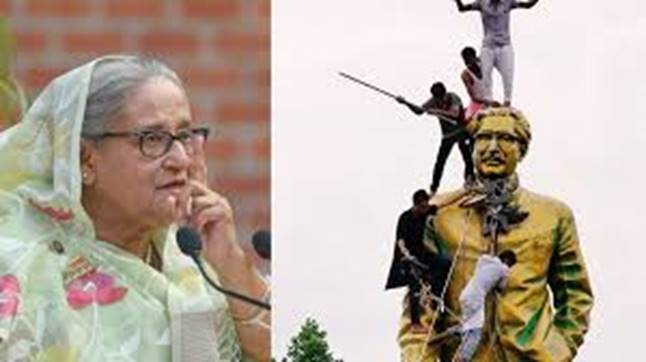
BusinessToday
Bangladesh's Second Liberation
By Senator Mushahid Hussain
Islamabad, Pakistan
The turbulence in Palestine and the transformation in Bangladesh have shaken the Middle East and South Asia. Both share common features of resistance to repression, reinforced by the weakened ability of state power to suppress popular uprisings, with long-held myths that now stand shattered due to altered ground realities.
In Bangladesh, there has been a historic change through a popular youth-led revolt that has been entirely indigenous, widespread and spontaneous, which has overturned an entrenched dictatorship that was solidly backed by the most powerful state of South Asia. What the people of Bangladesh are calling their 'Second Liberation' is basically a celebration of their liberation from Indian domination and diktat, as the dictatorial regime of Sheikh Hasina, functioning on a fake mandate after a rigged election on January 7, 2024, was perceived as an extension of Indian influence. This is, in fact, the biggest setback to Indian foreign policy interests in the region in the last 25 years since Pakistan became a nuclear power in May 1998. This setback comes on the heels of a growing assertion amongst smaller states of South Asia, including the Maldives, Nepal, Bangladesh and Sri Lanka, whose opinion leaders are openly denouncing Indian hegemony and India's interference through its intelligence agencies in their internal affairs. This was reflected in the statement issued on August 10 by five eminent personalities of Nepal, Sri Lanka and Bangladesh, where they came together to "demand that the government of India desist from interfering in our respective polities", adding that "New Delhi actively worked to prop up the autocratic regime of Sheikh Hasina over the past decade and received political and economic concessions in return". They also accused "New Delhi academia and media of unquestioningly following the dictates of their external affairs and the home ministries". Earlier in January 2024, in the Maldives, the election campaign was won by the Party, whose slogan was 'India out of Maldives!'
What is even more amazing in the case of Bangladesh's 'Second Liberation' is that, apart from being a triumph of democracy, it has destroyed myths that had been promoted by Sheikh Hasina over the decades. Probably, for the first time in any country's history, statues of the Hasina-proclaimed 'Father of the Nation' Sheikh Mujibur Rahman have also been toppled, similar to the demolition of the statues of Saddam in 2003. And in another remarkable development, monuments built for the 'Mukti Bahini' have also been destroyed, demolishing the mythology with all the bigotry, bias and bitterness that had been created by Sheikh Hasina about the tragic 1971 events.
Similarly, in the base of Palestine, Israel, which is a close ally of Modi's India, has suffered the biggest blow for the last 75 years, when it has been unable to defeat the Palestine resistance movement, Hamas, or destroy the popular resistance movement of Lebanon, Hezbollah. Israel, in the words of the American prominent academic and writer, Prof John Mearsheimer "has landed in deep trouble with no way out and stuck in Gaza" despite the genocide of Palestinian Muslims which now has a tally of 40,000 martyred, 90,000 injured, with destruction through 70,000 tons of rockets and bombs, but the myth of Israel invincibility stands shattered. Even the support of the US, as well as almost the entire West, has not been able to bail out Israel, which has lost the war politically, diplomatically, legally, and morally as well as in the battle of perceptions.
As far as the military campaign is concerned, the CNN, on August 5, gave an interesting report based on collaboration with American think tanks, that despite the Gaza Genocide, for Israel this has become an "unwinnable war with no military victory in sight, while Hamas's strength and support remain undiminished and Hamas has been able to rebuild its forces and replenish their ranks through accelerated recruitment".
So what are the key lessons for India in South Asia and Israel in the Middle East after their respective setbacks and biggest blows to their image and interests? For both, it should be a humbling experience as it demonstrates that Might is never Right and Right is Might. For Israel, it shows that the power and mystique it had built around its powerful military prowess and technology, including the 'invincible' Iron Dome, are brittle and vulnerable. For India too, the blow in Bangladesh is a lesson that size does not equal strength and people power can surmount and defeat state power. Interestingly, both Israel before 'Al Aqsa Storm' was unleashed on October 7, 2023, and Sheikh Hasina, before the Student Revolution, were basking in an illusory 'all-is-well' complacency. Netanyahu proudly unveiled a map of the 'New Middle East' before the UN General Assembly on 22 September. Biden's National Security Adviser Jake Sullivan confidently predicted to Foreign Affairs magazine on 29 September that "never before has the Middle East been as calm, peaceful and tranquil as today!" In some circles of Pakistani officialdom, after the rigged polls of Bangladesh on 7 January and before the rigged polls Pakistan on 8 February, inspired by Hasina's 'success', there was even serious talk of the 'Bangladesh Model', a long-stay Establishment-backed authoritarianism to promote economic development! While that is now, thankfully, history, after the ignominious exit of New Delhi's vassal, India is isolated in its own vicinity, as barring India and Bhutan, all of its neighbours have teamed up to join and participate in China's signature BRI.
With the dawn of the Asian Century, India needs to stand on the right side of history, promoting good neighbourliness, rather than promoting a New Cold War serving as a cat's paw for American interests in the heart of Asia. The Bangladesh 'shock' for India provides New Delhi with an opportunity for a new beginning with its smaller neighbours, with a changed mindset, bidding goodbye to the 'bully-on-the-block' mentality!
( The writer is Chairman of the Pakistan Senate Defence Committee. The Express Tribune)

